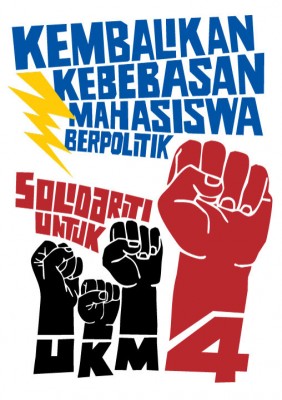 You’ve heard of the UKM4, you’ve read that they were arrested and are to face disciplinary proceedings under the UUCA, you’ve seen a re-energised student movement seeking to repeal the UUCA, and Court proceedings are on-foot. But how much do you really know about the protagonists?
You’ve heard of the UKM4, you’ve read that they were arrested and are to face disciplinary proceedings under the UUCA, you’ve seen a re-energised student movement seeking to repeal the UUCA, and Court proceedings are on-foot. But how much do you really know about the protagonists?
In this 3 part exclusive, King Chai, Hilman, Azlin and Ismail – four bright and passionate mahasiswa Sains Politik share with LoyarBurokkers – Ong Jo-Lene, Eunice Ong, and Lim Kar Mern, their stories, aspirations and the battle that lies ahead.
Part 1: Rebels or Revolutionaries? Find out just who are the “UKM 4.”
Part 2: Sitting Ducks or Schmucks? What they say really happened on the day of their arrest.
Part 3: Fight For Students Freedom!
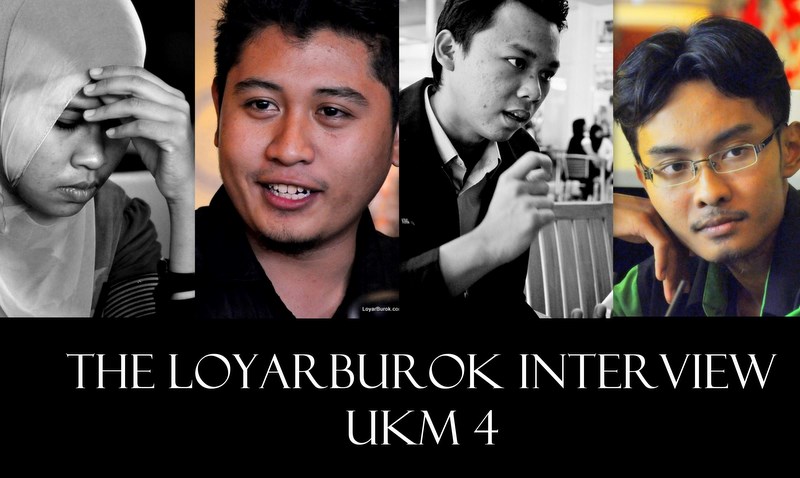
1. Do you regret going to Hulu Selangor?
Azlin, King Chai: We have no reason to regret.
Ismail: We all scored an A in all the subjects we sat for after the arrest, including Election Analysis, so agak berbaloi juga we made that field trip!
Hilman: No, I’ve been arrested 3 times; at the Sogo protest and again in HS when I went back to check on our impounded van.
2. Do you think you had a right to be in Hulu Selangor?
Azlin, Ismail, King Chai: Yes, because we believe in freedom of movement.
Hilman: If I can’t be in HS during by-elections or in Sibu during by-elections – what happens when its the general elections? Are they going to send all university students overseas for a holiday?
Also note that the UUCA also says that we cannot support our local political parties, but also international parties.This means that students cannot join yesterday’s anti-Israel demonstrations because it would supporting Hamas and Hamas is a political party.
3. While planning your field trip to Hulu Selangor during the by-election, did the UUCA ever crossed your minds?
Azlin: We are all aware of the UUCA but it did not cross my mind because I was not going to support or be in favour of any party. I don’t think we’ve done any wrong, tak bersalah, even if you go by the UUCA’s oppressive Section 15(5)(a).
Ismail: Actually, what we wanted to observe was the SPR (Election Commission).
Hilman: The point is that the field trip and observation directly relates to our major, especially that semester because we took Election Analysis. Furthermore, all of us are involved in campus politics and elections and we wanted to see how “big” real elections would be and how they are conducted.
King Chai: Whenever I was flustering about campus elections, Hilman would remind me, “Ini baru campus je, kita belum tengok kat luar lagi.”
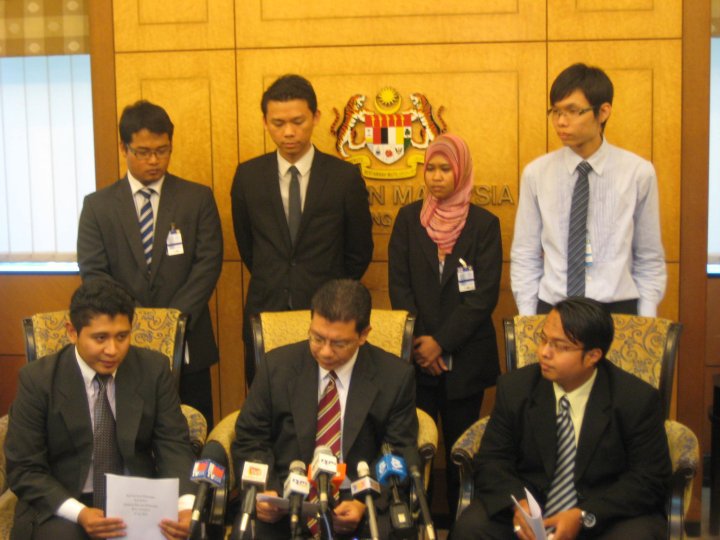
4. If you’re not guilty of breaching the UUCA, then why are you going a step further by going to court ?
UKM 4: We believe the UUCA should be abolished, Mansuhkan AUKU.
Ismail: Other than that, we refuse to stand “trial” at the internal disciplinary proceedings because it won’t be a fair one – it will be one sided – a case of “the judge, jury and executor.”
King Chai: We have been put this position through no fault of ours and not by choice either. Now that we find ourselves here, the four of us decided that it’s time to take a stand. Instead of just doing something that will only get the four us off the hook or be cowed into apologising when we truly believe we have done no wrong – we will challenge the constitutionality of the UUCA 1971. We have always believed it is unconstitutional and irrelevant to students.
We hope that the level of awareness amongst the students regarding this issue will bring about an atmosphere of change and confidence within the students to want to move towards reform and to embrace the challenge of being a mahasiswa that is not just focused in their studies but also concerned with issues in the society.
Hilman: The UUCA is an oppressive act. It limits students – from what we think, what we are allowed to say, down to our movement as proven in our case. Students cannot be expected to just bury their faces in books – if I don’t go into society, how will I join society? We want to show people that unfair and oppressive laws and acts like the UUCA can be challenged.
The voting age in the country is 21 years. We are all registered voters. So if we cannot be seen “to show sympathy or support to any political party”, how to vote?!? We can’t vote based on how handsome a candidate looks – we have to know what he stands for, what his party stands for and will do for society.
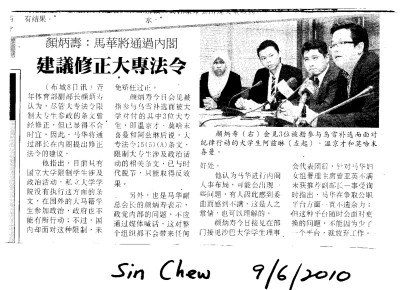
5. How has the reaction been to your case, especially from your peers in the university?
Hilman: We are very thankful for all of the support lent to us by the students, NGOs, public figures as well as ministers in the government, such as Deputy Youth and Sports Minister, Gan Ping Sieu who held a press conference to urge the government to look into our matter and the UUCA. To us, the support that we received is very important because it proves to us that our efforts are recognised – that we are not merely trying to get ourselves off the hook.
King Chai: No doubt there are one or two blogs or comments that are supporting the UUCA charge against us, but if we are to encourage a free and democratic society, then everyone has the right to their own views and opinions.
Civil society is pushing towards democratisation and the different views and perspectives put forward are crucial towards the building of a mature society. So, we have no problems against any of that.
However, when we came across the official statement from the university student representatives, Persatuan Mahasiswa UKM (PMUKM) President En.Hamzah and he urged us to be more “professional”, “patient” and “mature” in facing the charges spearheaded by the university administration without stating their stand on this issue affecting their own students. Their not taking a clear stand on this is quite disappointing, considering that they are the highest body of student representatives in the university.
Azlin, Ismail: The statement goes on in dramatic fashion about how we have “brought tears to our parents” and “lose focus on our studies and disappoint our loved ones.” But we are all top scorers and we have the complete support of our parents. (LB: All four have been Dean Listed in at least one semester)
6. Why isn’t the student body supporting you, their fellow students?
King Chai: Well, we believe that the current board of PMUKM representatives have gone slightly off-track in terms of fulfilling the philosophy or the objectives of a student council, which is to represent the needs of the students and to assist the students in any troubles that they may face.
Ismail: We also feel that the student council have lost it’s function as a “third force” within the university to spearhead change and reform at university level as well as to lead the students toward fulfilling their potential as future members of the society.
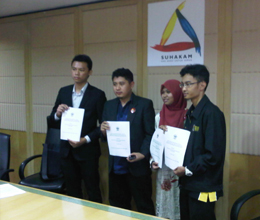
7. What lies ahead if disciplinary proceedings against you go ahead?
Azlin: I’ve participated actively in PALAPES since my first year. Unlike other students in the university, my 3 years of officer training will be in lieu of co-curricular subjects that other students have to take as electives.
This means there is a chance of being expelled from my unit if any disciplinary action is taken. If that happened, I will have to re-sit 4 semesters worth of co-curricular subjects in order to graduate.
King Chai: We could face a fine or suspension of rights or expulsion. For me, a warning alone will strip me off my scholarship.
8. Why do you think the university would want to punish you?
King Chai: We have now dragged this whole issue to the public and we have also been actively involved in campus activism as part of the Pro-Mahasiswa “faction” and some quarters equate that with being anti-establishment. Though I must stress that that is far from accurate.
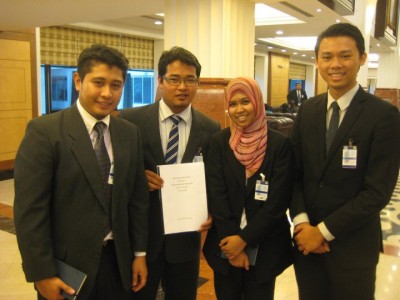
9. How do you think acts like the UUCA have affected and will continue to affect Malaysian graduates?
King Chai: We need to our youngsters freedom to think in order for them to have the ability to think. The university wants to control us. The youth has been restricted – our movement, our thinking, our voice. Where is our freedom?
Hilman: Looking at the restrictions in UUCA, it doesn’t allow students the freedom to make decisions. These students will go on to be our future leaders. Effectively we will have leaders that have never made decisions and will only be learning how to do so once they are leaders.
That is the reason for the poor quality of graduates nowadays that everyone is complaining about. If you are to be the future leader, you must have maturity and that comes in part from experience. For example, if you are a political science undergraduate and you have never been to a by-election, what’s the point?
Ismail: The UUCA is one of the reasons the younger generation has such a low level of participation in voting and so many are not registered as voters yet. Students are afraid to voice their opinion and are so used to being “not involved.”
10. Then why is the government imposing such a draconian act like the UUCA on the nation’s future – its students today?
Hilman: The youth movement is about creating awareness. With awareness, comes knowledge and empowerment and this creates a thinking society – one that can think for itself and not be easily manipulated or controlled.
Students are also what I’d term juru bicara masyarakat. Between or a politician, who is more believable when you go to a kampong to speak to the locals there? The student, because we are not bound by obligations nor do we have any personal interests vested in our activism; we have zero political interests to serve.
The youth fight on principle. And the people know this. So the government is trying to put a lid on us.

11. Do you have faith in the Malaysian judiciary?
The UKM 4: The KL High Court has set the inter-partes hearing on 17 June 2010 (tomorrow) to decide on the merit of our injunction. If the court decides that the injunction should stay, then the university cannot proceed with any disciplinary proceedings until the constitutionality of Section 15(5)(a) can be determined.
As our lawyers’ said, take everything at a 50/50 chance and let us all hope for the best. So yes we do have faith in the Malaysian judiciary.
Bangkit Mahasiswa!
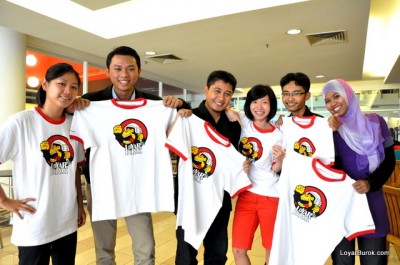
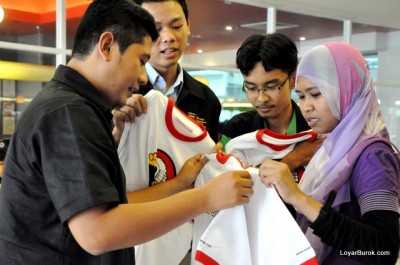
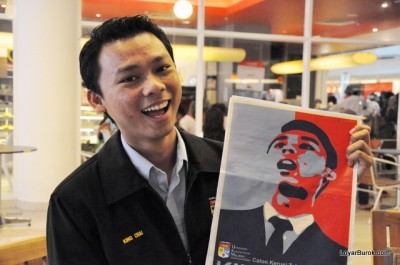
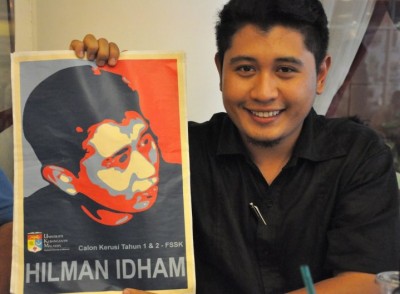

dear aston paiva,
i see your point. personally i would concur with you that the section 15 of uuca shouldn't be enacted at all. let us be reminded also that the whole uuca is substantially on the administration of universities, power of vice chancellors, management of uni etc. only certain sections affect the fundamental rights of students. hence, the proper solution is not to abolish the whole uuca but to repeal unconstitutional provisions. i would suggest that the uuca be amended, not outright abolishment.
whether we like it or not, section 15 is already enacted and in force. being a malaysian, i am quite sure that the court will rule section 15 of uuca as constitutional in favour of the government. even if the ukm4 appeals to the apex court, i find it that the ukm4 will eventually lose in the issue of constitutionality.
hence, i wrote my comment as asking readers to decide whether the mere presence in the vicinity of the hs by election and taking a ride in a vehicle loaded with election materials are tantamount to showing political participation as prohibited by uuca. i think the test to determine whether an act may amount to political participation must be outlined clearly so that not every single act will fall under the section 15 of uuca. this is to prevent university authorities from simply invoking section 15 to charge students even if the act may not amount to 'political participation or expression'.
somehow, i think they don't have good chances if keep on harping on the issue of constitutionality of section 15 uuca. perhaps we should look into whether their acts during the hs by election actually amount to political acts within the meaning of section 15 uuca.
Tuan Haji,
Thanks so much for the comments and further insights into the issue.
The report I had in mind was mentioned in Prof Mohamad Abu Bakar's book. Whether or not it eventually became the basis for UUCA does not matter but it provides the input which UUCA was later enacted; I mean the main ideas behind the legislation.
That is why I declined the invitation to discuss the amendments to the present UUCA and believe that it should be repealed altogether. We have too many laws already and the UUCA does not improve the standing of our IPTAs. Even in matters of student discipline and academic performance.
And because of the influence of the executive – that is allowed by the provisions of the UUCA – academic appointments are no longer on merit. Just look at the latest appointment in one of our IPTAs last week.
Saudara Prof Abdul Aziz,
As usual, your comments are succinct yet packed with vital information.
I agree with your analysis and add that Ibrahim Ali, then an ITM student leader, was also involved in the demos.
It seems that Tun Razak was hesitant to take drastic action against the UM students but Mahathir, as Education Minister, urged him to allow the police into the UM campus. Razak finally agreed when Mahathir said he would take the responsibility for the police taking over the campus.
The police moved in and several arrests were made under the ISA. Hishamudin Rais, the then Sec-Gen of the UM Students Union, managed to make his way through the semi-forests around the Pantai Campus and escaped into exile abroad for more than 20 years.
Mahathir had made his strong-arm point and was thus allowed to follow up with even more drastic amendments to the UUCA.
However, Prof, I am not sure what report you are talking about. As far as I can remember once Mahathir came on the scene no more reports were commissioned.
Perhaps you are talking about the NOC Tan Sri Abdul (Coco) Majid Report on ethnic relations in UM that was commissioned immediately post May 13.
I think Ungku Aziz, the then VC, though appointed as a member of the Campus Committee, refused the appointment. But the Report was a very good piece of work with excellent recommendations to improve ethnic relations in Campus. Many people, including Anwar Ibrahim, then UMSU President, gave valuable input to the Committee.
Nothing was done and when I look sadly at the state of our universities now I realise that the dangers the Report had predicted should their recommendations not be implemented have come into existence.
But I do not think that that Report was the basis, or justification, for the UCCA.
We had a great University system when the academics were running things.
Doctors don't always give you the right medicine as Malaysia has found out to its cost.
But there is hope still so long as we have dedicated academics like you, Prof, and Azmi Sharom teaching in our Universities.
It is also important to have some insights over the background which gave rise to the enactment of UUCA 1971 (AUKU); esp. the report on students movement at that time (1969-70).
That can be had from two books on this issue; one of them by Mohammad Abu Bakar (Mahasiswa Menggugat) and Junaidi Abu Bakar (can't remember the title but published by DBP or Penerbit UKM)
I think it was insecurity on the part of the then PM who came to power via a silent coup detat in UMNO in 1970 (following the May 13 riots in 1969).
The restrictions started by Tun Razak in 1971 was later tightened by Mahathir (the then Minister of Education) in 1975 after the 1974 Baling poverty mass demonstration led by student leaders including Anwar Ibrahim and Hishamuddin Rais.
Sad to say figures like Ungku Aziz and Tun Suffian had a hand in the preparation of the report which eventually gave birth to UUCA. They were close to Tun Razak anyway.
mh cheng,
I think the point Mr Leong above and myself have been trying to make is such a piece of legistion shouldn't even be in the law books for it is simple unconstitutional and in renders one's rights under Article 10 of the Federal Constitution illusory and ineffective.
So it matters not what the UKM4 were up to. Such a law should not even exist.
before we embark to discuss the effect of section 15 of uuca on the prohibition of political participation imposed on uni students, we need to consider whether an action will amount to political participation. surely there is no clear guideline to test whether an act may be construed as political participation or political expression. logically speaking, casting your vote during elections to support the contesting political party of your choice is definitely a political participation. registering yourself as a member of political party is also the same. but what about students like the ukm4 who were caught having their physical presence in the hs by election? or being caught boarding a vehicle loaded with campaign materials? can this act amount to political participation or showing political support to the contesting parties?
please be reminded that the ukm4 risk having their studies suspended or expelled as a uni student if proven guilty on the charge under section 15 of uuca. it would bring adverse effects to them. i personally think that the ukm authorities need to prove convincingly that the ukm4 indeed participated in the political process like campaigning for the political parties by distributing leaflets, giving political speeches or persuade the hs electorate to vote for certain political parties. any benefit of doubt should be given in favour of the ukm4.
in this case, the ukm4 contended that they were in hs to conduct observation and field study as part of their studies. they are political science students and took the subject called election analysis. they are also active in the ukm campus election process. the police has dropped investigation against the ukm4.
meanwhile, the ukm authority merely asserts that the ukm4 was caught boarding vehicles with lots of political flyers and were caught in the vicinity of the hs by election. the ukm authority has no other prove to show that the ukm4 committed other political acts within the meaning the section 15 of uuca.
now to all the readers of my comment, kindly consider if you are to act as a decision maker will you find that the ukm4 guilty of the charge under section 15 of the uuca? i would really appreciate any feedback or criticism of my comment. thank you.
Dear JR,
Good morning. Thank you for your thoughts on the matter. I might want to say a little.
There is only one supreme right and that is the right to life. This right is not given by Parliament or by law but by the fact that one is alive. No one should have the right to take that life away because (and I reason) that all of us acknowledge that we are not the Creator who had created that life. This must be true whether it be a Muslim life, a Christian life, a Mahasiswa life, a beggers life, an Orang Asal life or your life.
Now, to sustain life and eventually to achieve the pinnacle goal of every human being developing his personality to the fullest extent, one must be given the right to freedom. Freedom to move to look for food, freedom to take a job on a willing buyer willing seller principle, freedom to marry and freedom to associate – to name a few.
One important freedom that is needed to sustain those freedoms is the freedom of thought, conscience and speech. The law and the progressive minds of this world have always recognised such freedoms as fundamental along with the Right to Life.
Without the freedom to think freely, one cannot make up ones mind as to how to develop ones person to its fullest extent – unless of course you are of the view that it is NOT the goal of every human being to developing to the fullest extent. Maybe your goals in life are different. I will not dispute with you.
Students are citizens of this country and a member of humanity. They too have such rights. The right to make their own choices – whether it be about the best football club, the best dressed for the night, the best person to represent them in campus, the best policies of government, their choice of a spouse, their choice of an academic career, their choice as to who to associate with etc etc. If we prohibit these freedoms, can we then say that we have respected these people's fundamental rights OR allowed these people to develop their personality to the fullest?
Let us now look at your thought process.
Surely you would agree with me that Democracy does not mean rule of the mob. In the more progressive Democracies of today, the mob, however large have no rights to prohibit or stamp out the rights of the minority – however small because the small man has rights that are protected and recognised. This is the right over might theory.
If Democracy merely meant the mob, then it would be OK to remove the rights of the mahasiswa to freedom of conscience. It would also be alright to gas the Jewish people and the gypsies. It would be alright to enslave a racial grouping in this country. It would be fair to throw the Orang Asal off their land. It would be alright to force you to marry a Lesbian Chinese girl not of your choice. It would be alright to ban the Azan and demolish a church just because the majority said so?
Is this the majority rule that you speak about?
Surely if you did not like ice cream, you had the freedom NOT to partake in an ice cream feast. Surely if you had an aversion to political speeches, you would just leave it. Surely if you did not like what someone said, you can choose to ignore it. Surely if you did not like the religion of Christianism you would not convert into it. Surely if you did not like one girl you will not marry her. Surely if you did not like a job, you could leave it. Your recognisable right to choice is also the freedom to choose not to.
However, what you ask for is the 'convenience' of not choosing by using state power to deny the rights of others to freedoms of choice, expression and thought. This, I find to be disturbing.
Who gave anyone the right to deny others of their fundamental rights that directly support that right to life AND the right to develop ones personality to its fullest. In short, who gave us the right to enslave others? Is there such a thing as a right to enslave another? Majority rule perhaps?
Surely you jest with me and you tickle my leg.
Y.K. Leong
Dude, JR,
1. All of this comes down to a simple concept of freedom of choice. Just because 99% of people might not want to exercise a certain right doesn't mean that right needs to be taken away from the 1% of people who want to. Ultimately, I should have the choice to exercise that particular right (or not) but that right itself must never be taken away from anyone.
E.G You often times write in Malay. I never do. It would be unjust for the Malaysian govt to pass a law tomorrow that says English must be outlawed. Just because 66% of people are content with using Malay, does not mean the "segelintir" of us needs to be deprived of the ability to use English.
You may say "it maintains public order" or "it assists in the management of public morality". But you must show a reasonable link that my usage of English is the source of public disorder or public immorality. If you cannot show it, then your assertions are meaningless.
2. Democracy doesn't mean the majority is allowed to make up the law on anything. There a certain things which can never be touched. Your civil liberties being one of them. Freedom of Expression, Freedom of Religion, Right to Property, Right to Life and Personal Liberty, Freedom from Slavery and Forced Labour – these are things which can NEVER be voted on or to have a law passed which denies them to citizens. Determination of Civil Liberties can never EVER be subject to any vote, they exist independently and will continue to exist despite whatever political ideology takes over the seat of the Government or who the majority of the population are – Don't you forget that!
3. "Bancian yang dijalankan oleh pihak kerajaan?" Dude, c'mon man! Who are you kidding? The "bancian" that I did last month proves that I have a 9 inch schlong, a six pack and am able to keep a sperm bank in full supply for 12 years upon every visit. "Bancian terbaru" which I did yesterday proves that I can hold my breath underwater for 3 years, morph into a three legged hyena and make strawberry jam come out of my anus (all ready for packaging, marketing and distribution).
The Govt will tell you everything to keep itself in power. Bad Govt thrives on the ignorance of its citizens. Good Govt seeks to enlighten the population and encourage thought. That is the reality of the matter!
4. As for "pengaruh politik tidak disukai". Hey, that's democracy man. Be prepared to hear some offending, disturbing and shocking views. If you don't, then you can never call this joint a "free and democratic society".
Besides, your life shouldn't only have one view. What kind of one sided dead knotted mindless peon could live only having one point of view in life? You need some diversity in thought – it's really what makes life worth living.
Its no secret that the MOE wants to stifle the minds of future leaders of our country. Why so? Because the ruling BN gomen wants future leaders to be submissive and the universities is a good place to start brain-washing future leaders in their Psy-war.
May the judges who preside over this case uphold justice so that the future of Malaysia remains bright.
Saudara JR,
Saya fikir sdr mempunyai masalah besar di sini; dari segi memahami perlembagaan dan undang-undang selain memahami hak rakyat dan warganegara.
Memilih dan menyokong parti – apa saja parti baik BN maupun PR – adalah hak asasi dan fundamental dalam kehidupan bernegara. Mahasiswa sebagai warga dan manusia tidak boleh dikongkong. Sebenarnya isunya mudah dan langsung; tidak berbelit-belit.
Mohon maaf sdr; tulisan sdr cukup panjang. Tapi berbelit-belit. Saya fikir sdr perlu memahami konsep hak, bernegara dan seterusnya sebelum sdr terjun ke dalam perbahasan yang sulit ini. Sdr tidak harus mengelirukan orang lain dengan kekeliruan sdr itu.
Sdr juga gagal melihat isu keadilan di sini; menyokong PR ditangkap tapi membantu BN dibiarkan (sdr perlu ingat mahasiswa UiTM pernah terlibat secara langsung dalam mesyuarat dan pemilihan Umno).
Saudara-saudari yg saya hormati,
Penglibatan secara langsung dlm politik dalam kalangan mahasiswa tidak akan membawa kesan baik kepada universiti.
Cuba saudara/i bayangkan, seandainya mahasiswa bebas bergiat dlm politik sudah tentu kampus akan dijadikan MANGSA bagi mereka yang taksub ini untuk menyebarkan ajaran/pengaruh politik masing-masing. Adakah semua mahasiswa inginkan penyebaran pengaruh politik dalam kampus??? Tidak sama sekali, suka saya kongsikan di sini berdasarkan bancian yg dijalankan oleh pihak kerajaan; jelas memaparkan bahwa majoriti mahasiswa memang tidak berniat untuk berpolitik dalam zaman belajar. Malah, majoriti amat tidak senang hati dengan segelintir mahasiswa yg terlalu agresif dlm soal politik.
Sudah tentu anda semua terutamanya yg telah berjaya dalam bidang pekerjaan masing-masing suka dan berhasrat untuk melihat mahasiswa berpolitik kerana bagi anda, hak untuk berpolitik tidak patut dilucutkan atas sebab dia seorang mahasiswa. Ia adalah bertentangan dengan Artikel 8 – kesamarataan dan Artikel 10 – kebebasan berpersatuan. Adakah saya tidak tahu artikel-artikel ini??? Sudah pasti tidak. Saya melihat ruang/ hak berpolitik dalam kampus dari sudut yg jauh dan skop yg lebih luas. Saya lebih bertumpu kepada kesan jangka panjang.
Rakan-rakan, penyebaran ajaran/pengaruh politik dalam kampus kurang disenangi oleh majoriti mahasiswa. Ini adalah fakta. Jangan sesekali menafikan fakta. Mahasiswa lebih berminat untuk menumpu sepenuh perhatian dalam pelajaran masing- masing supaya mendapat kecemerlangan dalam bidang akademik dan korikulum.
Bagi kita, dapatan ini tidak menunjukkan bahawa mahasiswa tidak aktif ataupun mahasiswa kurang berkedepan; ini tidak menjadi persoalan atau pertimbangan kita, apa yang lebih mustahak untuk dipertimbangkan oleh kita semua di sini tanpa kira anda pejuang hak manusia/pelajar/peguam dan sebagainya adalah berkenaan wajar atau tidak bagi pihak legislatif membuka satu ruang dalam undang2 khususnya Auku hanya untuk membenarkan segelintir pelajar ini berpolitik???
Suka saya berkongsi dengan mahasiswa yg teringin sangat berpolitik khususnya UKM4, sebenarnya kita (mahasiswa) ada banyak peluang dan cara untuk bergiat aktif dalam waktu/zaman degree/prasiswazah. Saya juga minat sangat berpolitik, tetapi kenapa saya tidak? Ini adalah disebabkan saya tahu tiada perlunya untuk saya bergesa2 untuk berpolitk. Biarlah kita semua habis menuntut pelajaran, cemerlang dlm bidang masing- masing; barulah kita berpolitik. Ini adalah relevan kerana kita semua sedar bahawa ahli politik di Malaysia tidak cukup berpendidikan, maka saya dan anda (mahasiswa) kita wajib mula perbetulkan masalah ini. Apa yang lebih penting kepada kita semua di sini khususnya mahasiswa, kita sewajarnya mengambil peluang untuk melibatkan diri dalam aktiviti anjuran universiti/kerajaan. Banyak sangat peluang untuk kita mendapat pendedahan kepada pengalaman luar negara/program bertaraf antarabangsa dan sebagainya. Kenapa kita pilih melakukan benda yang salah dan yang tidak disenangi oleh rakan- rakan kita???
Di sini, saya tidak prejudis terhadap pihak pembangkang; malah apa yg saya nampak adalah kesan panjang penglibatan mahasiswa dalam politik yang bakal mendatangkan masalah kepda institusi-institusi pengajian tinggi.
Apakah anda semua ingin melihat menara-menara gading dijadikan fokus serangan parti politik samada Barisan ataupun Pakatan untuk meraih sokongan/simpati??? Adakah pensyarah-pensyarah boleh terus aman berkuliah dengan pelajar-pelajarnya memberi risalah/menyebar ajaran politik sewaktu dalam kuliah???
Apakah pemikiran mahasiswa patut dikongkong oleh mana-mana parti politik???
Bukankah mahasiswa yg celik huruf sepatutnya dapat mengupas suatu isu atau melihat satu persoalan dari sudut yg indipenden???
Minda/pemikiran mahasiswa yg dikongkong dan ditakluki mana-mana parti politik sudah pasti tidak akan melihat suatu isu secara menyeluruh.
Tiada perlunya suatu undang- undang/akta/enakmen digubal/dipinda hanya untuk memuaskan hati segelintir mahasiswa yg teringin sangat untuk berpolitik.
Memang, saya tidak sama sekali menafikan bahawa penglibatan antara mahasiswa dalam politik boleh disifatkan sebagai satu hak yang termaktub di bawah perlembagaan.
Maka, pemerhatian/prihatin saya adalah lebih mejurus kepada kesan/impak jangka masa panjang yg bakal melanda.
Kepuasan segelintir mahasiswa untuk berpolitik selama 3 tahun pelajaran dalam kampus bakal meninggalkan kesan padah kepada universiti yg tidak dpt diselesaikan dalam jangka 3 tahun. Mahasiswa yg sedia ada hanya akan mendapat kepusasan tersebut selama 3 tahun iaitu tempoh pembelajaran dan mereka akan tinggalkan universiti kemudian.
Maka, saya adalah dengan pendirian bahawa undang-undang AUKU 1971 tidak patut dipinda malah dihapus hanya untuk memuaskan hati segelintir mahasiswa yg ingin berpolitik serta pandangan majoriti yg tidak inginkan pengaruh politik dalam kampus wajar diberi perhatian.
"Saudara perjuangkan demokrasi, inilah demokrasi; hormat kepada pandangan ramai. Adakah anda ingin katakan majoriti yg tidak berpihak kepada anda bukan suatu majoriti???"
Ini adlah semirip seiras dengan kenyataan parti politik tertentu yang mengatakan sekiranya mahkamah tidak memberi penghakiman kepada dia, maka mahkamah adalah tidak adil. Bias, breach of natural justice; inilah yang selalu dilaungkan oleh parti politik tertentu.
Jangan, jangan, jangan; mahasiswa yg pandai dan bijaksana tidak patut dikongkong mindanya oleh mana- mana politik.
Alangkah indahnya sekiranya mahasiswa2 dapat menilai suatu isu secra indipenden…
Renung-renungkanlah…
Salam sejahtera.
put it this way, the reason why the students are not allowed to involve in politics is mainly cause by the incident of students reformation in 70's led by Anwar Ibrahim, who was a student in Univ Malaya. Thousands of students joined to condemn Tun Razak's government. Issues such as famine in Baling and hardcore poverty was raised. later, hundreds of students faced disciplinary action (though later charges were dropped since they are too many students). since then, students were barred since it may cause another incident of the same nature. reasons were then given that it may affect their studies, immature by age and may act impulsively on certain aspects and even possibility of being manipulated to serve other parties' interests. thus, with the enforcement of UUCA, students should be able to study without any distraction what-so-ever. yet, doubt remains, why does from each corner comes complaint on poor quality of local graduates? still, contradictly, reports on students achieving better CGPA by year also being published? how about the brain drain issue whereby our talents are migrating to other countries?
this is when doubts surfaces, starting to cloud our tailored reality. what is happening to our so-called human capital and so far how does government acts on this? one might say that i'm not into politic but life as a whole is a politic. if you are saying that all parties are the same, don't complain on anything even on a price hike since silence is bliss. voting is the only means of talking. you don't like the way things are done, show it on the ballot.
I wonder why students are not allowed to be involved in politics even though when the Constitution allows any one who is 21 years old & above can do so.
Look, on the contrary, lecturers or professors can do so. Is it justice? Read details in para 3 of this website: http://www.asyrafwajdi.com/profil.html